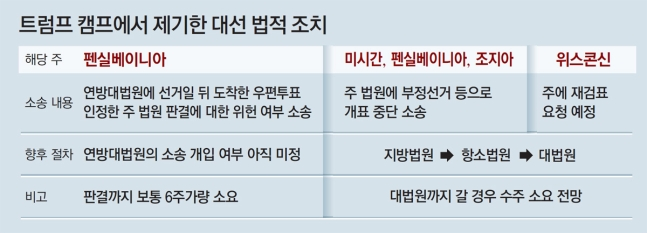The U.S. presidential election, which took place on November 3, had the highest voter turnout in history, despite cases of COVID-19 ravishing the nation. More than 100 million people took advantage of pre-election day voting, by mailing in ballots or dropping them off in-person at designated drop off sites, a nearly 75 percent increase from the previous election. The winner was determined by adding up the results of the on-site and mail-in ballots. Joe Biden won the election with a total of 306 electoral votes, flipping five states including Pennsylvania, Georgia, Wisconsin, Arizona, and Michigan. However, President Donald Trump is refusing to concede defeat. He earned 73 million votes or 47.2 percent of the total ballots cast, the highest number ever garnered by a Republican presidential candidate. However, despite the impressive numbers, President-Elect Biden earned over 80 million votes representing 51.1% of total ballots cast making him the clear winner. So why is the current President refusing to concede? To fully understand his reasoning, we need to examine the US electoral system.
 |
| ▲ 2020 U.S. presidential candidates Donald Trump and Joe Biden. (Photo from TBS NEWS) |
The US Presidential election operates under a system of direct and indirect voting. It is a year-long process and can be broadly divided into elections by political parties and a general election. Political party elections are conducted to select delegates that will vote for the party leader of their choosing. The person who secures the most representatives in the party, becomes their presidential candidate. The United States is mainly a two-party system that consists the Democratic and Republican parties, and these two parties elect presidential candidates through an election of representatives. Once their candidate is confirmed, the election begins in earnest.
The main election is made up of votes for the electoral college and a separate presidential election. During the electoral college election, ordinary voters cast ballots for their desired presidential candidate. The results of each state election signals to the electoral college representatives in that state, the will of their people, in voting for the president. While the electoral college representatives are not required by law to vote for the president selected by their state, it is common practice that they do, to preserve the nation’s foundations of democracy.
The electoral college system is a ‘winner-take-all’ approach where the candidate with the most votes in the state, take all the electoral votes the state has. Some states have more than others as it is a number dependent on the number or Representatives in each state. This makes some states more important in elections than others. There are 538 people that make up the electoral college and a presidential candidate is said to win the election if they earn 270 electoral college votes. During this election, due to COVID-19, the number of mail in ballots increased causing a lot of controversy over the fairness of the election results.
Donald Trump was in the lead in some states on November 5, until the counting of mail-in ballots began. It was neck and neck in 6 states including Wisconsin, Michigan, Arizona, Pennsylvania, and North Carolina. Joe Biden had already lost Texas and Florida, but he built momentum with a convincing lead in North Carolina before finally losing this state too. He then dominated the so-called Rust Belt which covers states in the Northeastern and Midwestern United States. By the time 95 percent of the state of California’s votes had been counted, Biden had secured 264 electoral college votes – six shy of the magic number of 270 needed to win the US presidency. When the total ballot count was complete, Joe Biden had 306 electoral votes to Donald Trump’s 232.
 |
| ▲ Trump's lawsuit claiming rigged elections. (Photo from Dong-A Daily News) |
However, President Trump insisted the election was fraudulent because ballot tallying in Michigan, Wisconsin, Georgia was delayed due to late mail in ballot counts, and the issue of voter fraud was raised. The Trump campaign filed lawsuits asking for the invalidation of results in 5 states including Pennsylvania, Georgia, Michigan, Arizona, and Nevada. However in each of the cases, judges found the campaign’s claims to be lacking in evidence of significant irregularities. This means that Donald Trump’s attempt to see the U.S. Supreme Court adjudicate the contested vote totals in several key battlegrounds failed.
Trump’s behavior post-election raised concerns around the globe. The world is watching and hoping for a smooth transition between parties. It is crucial to put an end to the questions of future governance for both domestic and international security. Let’s hope they find their way out of this controversy as soon as possible.
박유정, 박소현, 서영진 dankookherald@gmail.com

![[Campus Magnifier] Let's Surf the Library!](/news/photo/202404/12496_1765_4143.jpg) [Campus Magnifier] Let's Surf the Library!
[Campus Magnifier] Let's Surf the Library!
![[Campus Magnifier] Let's Surf the Library!](/news/thumbnail/202404/12496_1765_4143_v150.jpg)





